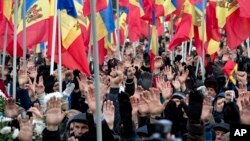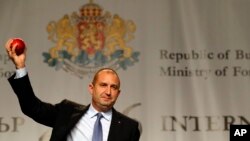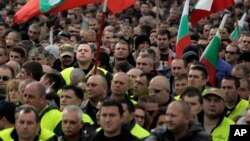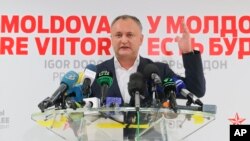Voters in Europe’s poorest country, Moldova, and the European Union’s poorest member, Bulgaria, elected Russia-leaning presidents Sunday.
In Bulgaria, Socialist-backed General Rumen Radev, a former air force commander who wants to lift EU sanctions against Russia, won by a wide margin against the ruling center-right GERB Party candidate Tsetska Tsacheva, securing 59 percent of the vote compared to Tsacheva’s 36 percent. Prime Minister Boyko Borisov resigned his post after the defeat.
In Moldova, the staunch pro-Russia leader Igor Dodon, who has in the past threatened to tear up an EU association agreement in favor of a trade deal with Russia, won by a narrower margin. In a second round runoff, Dodon received 52 percent of the vote compared to pro-Europe rival Maia Sandu’s 48 percent according to the Moldovan Central Election Commission.
While the post of president is mainly ceremonial in both countries, the election of candidates who favor closer ties to Russia is significant, says political analyst at the Moscow State Institute of International Affairs Victor Mizin.
“You cannot ignore the fact that this shows at least a very important, substantial part of the constituencies in both countries is leaning more to the position which is favorable to the major principles or major slogans of Russian foreign policy or just the image of Russia," he says.
Leaning back toward Moscow?
Both Bulgaria and Moldova are largely dependent on Russian energy exports. They maintain trade relations, despite EU sanctions against Russia over its actions in Ukraine and the ban Moscow imposed on imports of Moldovan wine and other agricultural products after Moldova signed an EU association agreement.
The EU’s image has been damaged in both countries, where the public perceives economic progress as too slow and sees a failure to tackle corruption by nominally pro-EU leaders.
In Moldova, the backlash was particularly pronounced after a billion dollars, 12 percent of GDP, disappeared from banks.
Many young people left the former Soviet republic and Soviet bloc countries for better opportunities in Russia and Europe. Those left behind, mostly the older generation, still strongly identify with Russia.
“And my prediction is that it’s just the beginning, that more and more candidates who are, how to say, anti-European Union, and that means unfortunately, logically, more pro-Moscow, that we’ll see this trend of more and more of the people of this sort coming to power in the future,” says Mizin.
Russia’s Interfax news agency Monday quoted Konstantin Kosachev, the chairman of the International Affairs Committee of the Federation Council, the upper chamber of Russia's parliament, as saying the “‘visually powerful' liberal-Atlantic system has now failed in Bulgaria and Moldova.”
Russia’s Foreign Ministry said it was too early to call either presidents “pro-Russian,” but that it counts on Moldova to strengthen neutrality when the next president takes office.
Russian President Vladimir Putin congratulated the new Bulgarian President-elect Radev, saying in a statement he was confident that joint efforts would give new impetus to bilateral dialogue and broaden cooperation in various fields for the benefit of both their peoples.
But analysts say the elections are more a reaction to internal problems of governance than a wholesale rejection of the EU in favor of Russia.
Balancing act
The public in Bulgaria and Moldova is divided between Europe and Russia, says Leonid Gusev of the Institute of International Studies at the Moscow Institute of International Relations: “One part wants to be with Russia more and [the] other part wants to have [a] pro-European direction.”
Striking a balance between East and West will be key for the new presidents to succeed, says Gusev. “Especially in Bulgaria because Bulgaria, as you know, is a member of [the] European Union, is a member of NATO," he says. "Even Rumov, during his campaign, also said that Bulgaria will be in these two blocs - in NATO, in [the] European Union.”
Gusev says president-elect Dodon will face resistance from Moldova’s pro-EU parliament if he goes ahead with an earlier call to withdraw from the 2014 EU association agreement, risking visa-free EU entry for Moldovans.
“I don’t think that Mr. Dodon will take away this no visa regime with [the] European Union because I personally saw in Brussels, in Germany, a lot of people from Moldova who work there for a long time," he says. "I think he will try to have balance between connections with Russia and between connections with European Union.”
Dodon told Russian state media Monday that his election victory was a vote for rapprochement with Russia and for resolving the frozen conflict in Trans-Dniester - the breakaway region of Moldova also known as Transnistria that wants to be part of Russia, and where Moscow has stationed thousands of troops.
Some 1,500 people died in a conflict between pro-Russian Transnistrian separatists and the Moldovan government in 1992.
There’s no pragmatic and acceptable solution for Trans-Dniester that would satisfy all sides, says Mizin: “And, of course, as I understand it, Russia has no intention to withdraw its troops from Transnistria because some people I know in the Russian Ministry of Defense are afraid that it would immediately spark the beginning of, once again, the military conflict there.”
Political analysts say the ongoing fighting in neighboring Ukraine has left leaders across Moldova, Russia, and the West wary of spreading conflict.







